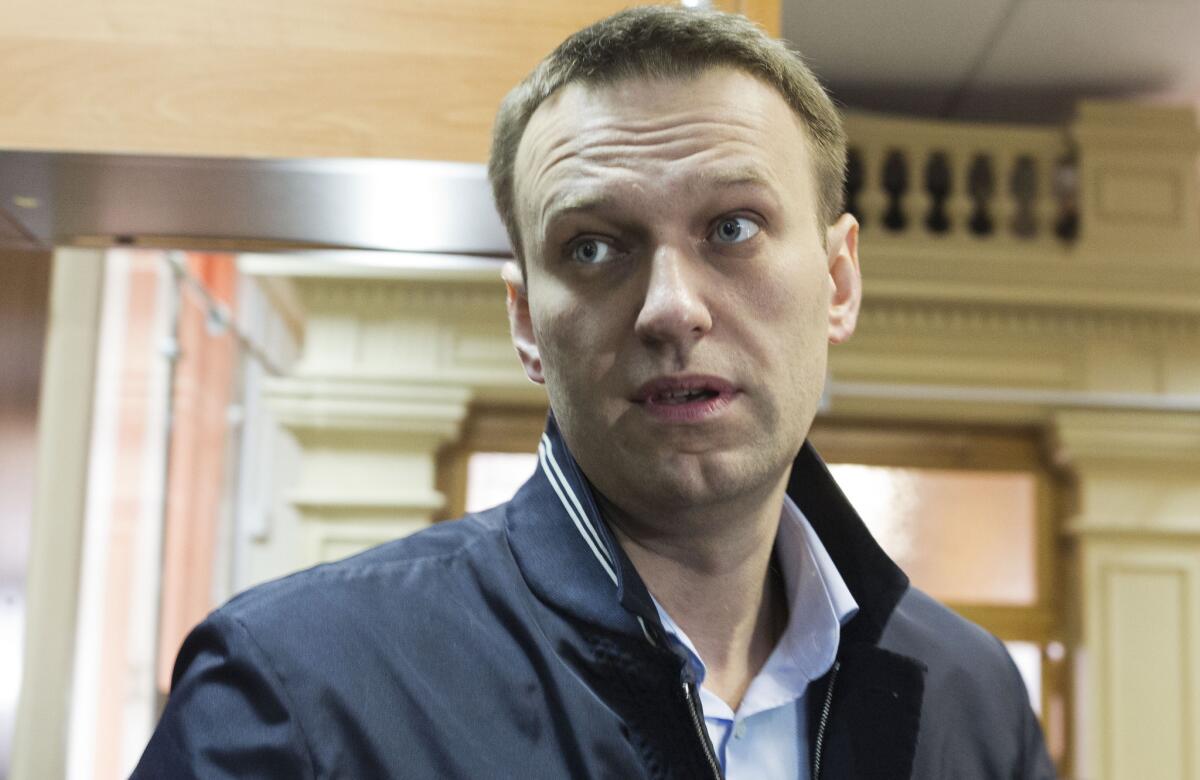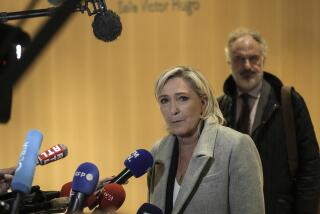Trial opens for Russia opposition leader, who calls claims absurd

MOSCOW â One of Russiaâs most prominent opposition leaders went on trial Wednesday, proclaiming his innocence but predicting that the case will lead to a lifetime ban on his participation in Russian electoral politics.
âAny independent court would find these absurd charges totally ungrounded, but I have little doubt that I will be convicted in the end,â Alexei Navalny said in a phone interview with The Times. âOtherwise the Kremlin wouldnât have risked organizing this trial.â
Navalny, 36, is a lawyer, blogger and political activist who has portrayed himself as a future presidential candidate. He faces charges of organizing an embezzlement scam causing about $530,000 in damage to an obscure lumber company in the Kirov region in 2009.
As the trial began in Kirov, the regional capital about 500 miles northeast of Moscow, Navalny pleaded not guilty and called the charges politically motivated. He said they were part of a wider campaign by President Vladimir Putin to sideline and marginalize the opposition.
âThey want to scare the wits out of the opposition and disqualify its leaders from official political struggle,â he said, âbut this house of repression and intimidation Putin has been building will fall together with him one day.â
Navalny, whose popularity is rooted in young, liberal circles, is considered the most prominent opposition politician to go on trial since the breakup of the Soviet Union. His case has been compared to that of Mikhail Khodorkovsky, who was the wealthiest man in Russia and a potential political rival when Putin had him arrested in 2003 on charges of fraud, tax evasion and money laundering. That case was widely seen as politically motivated, and Khodorkovsky remains in prison.
Navalnyâs case is set against the backdrop of a newly aggressive Kremlin campaign to disrupt and discredit both its political opposition and independent nongovernmental organizations, especially those with foreign ties.
âIn the year since Vladimir Putinâs return to the presidency in May 2012, the Russian government has unleashed a crackdown on civil society unprecedented in the countryâs post-Soviet history,â Human Rights Watch charged in a report issued Wednesday as the trial began. âThe authorities have introduced a series of restrictive laws, harassed, intimidated, and in several cases imprisoned political activists, interfered in the work of nongovernmental organizations (NGOs), and sought to cast government critics as clandestine enemies, thereby threatening the viability of Russiaâs civil society.â
Since Putinâs inauguration last May, more than two dozen people have been arrested and face charges of taking part in mass disturbances, and the State Duma, parliamentâs lower house, passed legislation restricting the activities of NGOs. Navalny said that, in addition to the charges against him, authorities have accused his brother and mother of working with him to embezzle and launder money.
âEvery time I expose some top-rank crook, they retaliate with a new investigation,â he said.
Navalny said there are only two possible outcomes of the trial â he will be sent to prison for up to 10 years or he will receive a suspended sentence. Under current law, either would disqualify him from taking part in any elections in Russia for life.
âWith his charisma, presidential ambitions and growing public support, Navalny is likely to repeat the fate of Khodorkovsky,â Dmitry Oreshkin, a senior political researcher with the Institute of Geography, said in an interview. âThe Kremlin continues to demonstrate its determination to restore the old Soviet ways of managing the country, to plunge the country in an atmosphere of fear and freeze Russian political life indefinitely.â
Navalny gained fame several years ago when he accused the state-owned natural gas giant Gazprom of multimillion-dollar corruption and filed an official complaint that never ended up in court.
Since then he has accused a number of Russian officials of corruption, including possession of undeclared overseas bank accounts and property. Among them was Alexander Bastrykin, the head of the Russian Investigative Committee, who was said to own an undeclared apartment in the Czech Republic, and Vladimir Pekhtin, first deputy head of the ruling United Russia Party in the State Duma, who resigned in scandal earlier this year after Navalny uncovered his alleged ownership of a lavish apartment in Miami.
Navalnyâs own methods can effectively work against him, a senior official suggested in an interview Wednesday.
âCrimes committed [by the opposition] are not legal forms of political struggle,â said Sergei Zheleznyak, a top United Russia functionary and deputy speaker of the State Duma. âThe only legal way of finding out who is guilty and who is not is getting a courtâs decision and this is what is happening now.â
Zheleznyak denounced the Human Rights Watch report as biased interference in Russiaâs internal affairs.
ALSO:
Russia mass shooting suspect captured
Italy nominates youngest prime minister in years
Hagel calls claims of Syrian chemical weapons use only âsuspicionsâ
More to Read
Sign up for Essential California
The most important California stories and recommendations in your inbox every morning.
You may occasionally receive promotional content from the Los Angeles Times.










